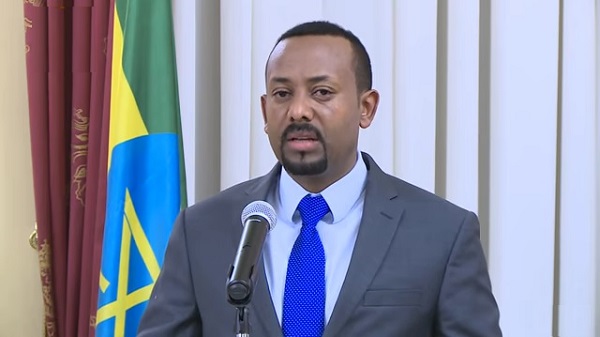
Ethiopian Prime Minister Abiy Ahmed has visited Sudan for meetings with military leader Abdel Fattah al-Burhan, his first trip to the neighbouring country since a 2021 military coup there.
Relations between the two Horn of Africa countries have been fraught with tensions in recent years, including over a border dispute and refugees from the two-year conflict in Ethiopia’s northern Tigray region.
Sudan’s ruling sovereign council on Thursday said in a statement that al-Burhan and Abiy held talks in Khartoum on “ways to strengthen and enhance bilateral relations”.
It also said that the two men are “aligned and in agreement” on a controversial Ethiopian mega-dam on the Blue Nile which Egypt views as a threat.
“Burhan emphasised… that Sudan and Ethiopia are aligned and in agreement on all issues regarding the Grand Ethiopian Renaissance Dam (GERD),” the sovereign council, which Burhan chairs, said.
The dam has been the source of tensions between Ethiopia and downstream countries, Egypt and Sudan, ever since work began in 2011.
Multiple rounds of talks between the three governments have failed to produce an agreement over the filling and operation of the reservoir.
Egypt is dependent on the Nile for irrigation and drinking water and the Blue Nile accounts for more than 80 percent of its flow.
Sudan hopes the dam will regulate annual flooding and generate electricity, but has voiced fears that its own dams will be harmed without agreement on its operation.
Addis Ababa sees the project as indispensable for its development and insists it will not affect Egypt’s or Sudan’s share of the Nile’s water.
Ethiopia’s decision to start filling the dam’s huge reservoir in 2020 without prior agreement with the downstream states drew condemnations from both Egypt and Sudan.
In February 2022, Khartoum and Cairo slammed Addis Ababa for unilaterally deciding to start power generation at the dam.
Border and politics talk
Burhan and Abiy met in Ethiopia in October, but the Ethiopian prime minister last visited Sudan in August 2020, during the transitional government of former Prime Minister Abdalla Hamdok.
Tensions heightened between Khartoum and Addis Ababa following the conflict that broke out in November 2020 between Ethiopia’s federal government and the Tigray People’s Liberation Front (TPLF).
Fighting drove tens of thousands of people to seek refuge in Sudan.
In November, Ethiopia’s government signed a peace deal with the TPLF to end the war that has, according to the United States, killed as many as 500,000 people and triggered a severe humanitarian crisis.
Relations between Sudan and Ethiopia have also soured in recent years over al-Fashaqa, a fertile border strip long cultivated by Ethiopian farmers but claimed by Sudan, sparking sporadic deadly clashes.
By June of that year, Sudan had recalled its ambassador to Ethiopia in protest of the latter’s troops reportedly executing seven of its soldiers and displaying their bodies to the public.
It was not clear whether the border dispute or dam discussions are on the agenda during Abiy’s current visit.
Sudan’s sovereign council said Abiy will also meet Sudanese political factions.
Deepening unrest has gripped Sudan since the October 2021 Burhan-led coup, which upended a transition to civilian rule installed following the 2019 removal of longtime President Omar al-Bashir.
In December 2022, Sudanese military and civilian leaders signed an initial peace deal as part of a two-phase political process.
Source: News Agencies























